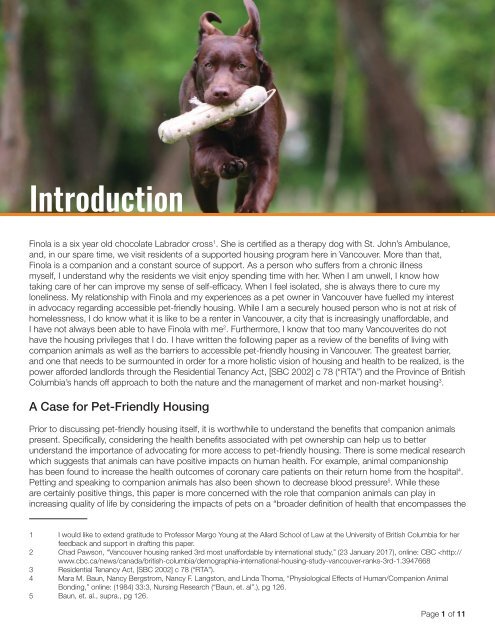Create successful ePaper yourself
Turn your PDF publications into a flip-book with our unique Google optimized e-Paper software.
Introduction<br />
Finola is a six year old chocolate Labrador cross 1 . She is certified as a therapy dog with St. John’s Ambulance,<br />
and, in our spare time, we visit residents of a supported housing program here in Vancouver. More than that,<br />
Finola is a companion and a constant source of support. As a person who suffers from a chronic illness<br />
myself, I understand why the residents we visit enjoy spending time with her. When I am unwell, I know how<br />
taking care of her can improve my sense of self-efficacy. When I feel isolated, she is always there to cure my<br />
loneliness. My relationship with Finola and my experiences as a pet owner in Vancouver have fuelled my interest<br />
in advocacy regarding accessible pet-friendly housing. While I am a securely housed person who is not at risk of<br />
homelessness, I do know what it is like to be a renter in Vancouver, a city that is increasingly unaffordable, and<br />
I have not always been able to have Finola with me 2 . Furthermore, I know that too many Vancouverites do not<br />
have the housing privileges that I do. I have written the following paper as a review of the benefits of living with<br />
companion animals as well as the barriers to accessible pet-friendly housing in Vancouver. The greatest barrier,<br />
and one that needs to be surmounted in order for a more holistic vision of housing and health to be realized, is the<br />
power afforded landlords through the Residential Tenancy Act, [SBC 2002] c 78 (“RTA”) and the Province of British<br />
Columbia’s hands off approach to both the nature and the management of market and non-market housing 3 .<br />
A Case for Pet-Friendly Housing<br />
Prior to discussing pet-friendly housing itself, it is worthwhile to understand the benefits that companion animals<br />
present. Specifically, considering the health benefits associated with pet ownership can help us to better<br />
understand the importance of advocating for more access to pet-friendly housing. There is some medical research<br />
which suggests that animals can have positive impacts on human health. For example, animal companionship<br />
has been found to increase the health outcomes of coronary care patients on their return home from the hospital 4 .<br />
Petting and speaking to companion animals has also been shown to decrease blood pressure 5 . While these<br />
are certainly positive things, this paper is more concerned with the role that companion animals can play in<br />
increasing quality of life by considering the impacts of pets on a “broader definition of health that encompasses the<br />
1 I would like to extend gratitude to Professor Margo Young at the Allard School of Law at the University of British Columbia for her<br />
feedback and support in drafting this paper.<br />
2 Chad Pawson, “Vancouver housing ranked 3rd most unaffordable by international study,” (23 January 2017), online: CBC


